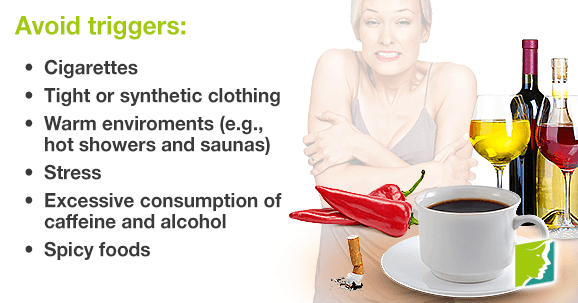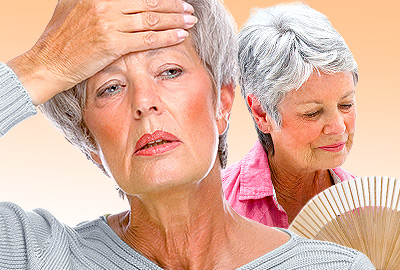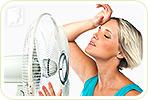Hot flashes can be one of the most common menopause symptoms, and also one of the most bothersome, affecting 75% of menopausal women.
While some women who get hot flashes remain relatively unaffected, for other women hot flashes and the resulting side effects, such as chills, can have a significant impact on daily life.
Understanding Hot Flashes and Chills
A hot flash occurs when the temperature of the body suddenly rises and causes sweating, nausea, headaches, and sometimes chills.
Hot flashes during menopause are caused by hormonal fluctuations. First, the body becomes confused about its internal temperature and turns up the heat. Then, realizing its mistake, the blood vessels dilate to cool down the body. This can cause excessive sweating and sometimes chills. Read more below on what you can do to prevent hot flashes and chills.
What Should I Not Do?
The following is a list of the most common substances which may trigger or worsen hot flashes in some women:
- Smoke
- Wear tight or synthetic clothing
- Avoid warm environments (e.g., hot showers or saunas)
- Stress
- Excessive consumption of caffeine and alcohol
- Spicy foods
What Can I Do about Hot Flashes and Chills?
There are a few ways that can help you reduce the frequency and the strength of hot flashes and chills. Here's a list of the most basic remedies:
Exercise daily. Walking, swimming, dancing, and biking are all good options.
Stay cool. Use fans during the day and wear breathable clothes made from natural fabrics such as cotton.
Slow abdominal breathing. Practice deep breathing for 15 minutes in the morning, 15 minutes in the evening, and at the onset of hot flashes.
As mentioned above, exercise and a healthy diet can greatly improve your body's ability to respond to the changing environment.
Alternative medicines have been known to help reduce the effects of hot flashes. Aromatherapy, acupuncture, and massage can help relieve stress, and some herbal supplements can help correct hormonal imbalances thought to cause hot flashes and chills.
If you wish to pursue medical treatments for hot flashes, consult your doctor about the risks and benefits associated with hormone replacement therapy (HRT) or other medical procedures.
Recommendation
If you are experiencing hot flashes and chills and have not spoken to your doctor already, now is a good time to do so. Your medical practitioner can help you find the right solution. Explore the following link for more information on treatment for hot flashes and chills.
Sources
- Sikon, Andrea and Holly Thacker M.D. "Treatment for Menopausal Hot Flashes". Cleveland Clinic Journal of Medicine. July 2004: 71 (7).
- "Hot flashes ... in January". Canadian Medical Association Journal. 2004: 170 (1).
- Miller, Heather and Rose Maria Li, M.D. "Measuring Hot Flashes: Summary of a National Institutes of Health Workshop". Conference report. Mayo Clinic. June 2004: 79.




